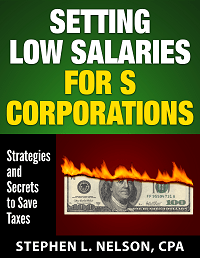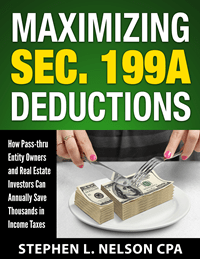The S Corporation Section 199A deduction gets complicated. Especially for S corporation business owners who don’t get good advice from a knowledgeable tax accountant.
Accordingly, this short post explains how an S corporation handles the Section 199A deduction.
More specifically, the post describes how wages play into the calculations—and when they don’t matter. It briefly discusses when an S corporation should increase shareholder-employee wages. And finally it points out a subtlety some S corporations and their accountants miss.
Note: We have updated the information in blog post for the final regulations that appeared on January 18, 2019.
How S Corporation Section 199A Deduction Works
Let’s assume an S corporation generates $100,000 of business profit before paying the owner any wages.
Further, let’s assume that a careful analysis of what would be an appropriate owner salary leads to a decision that the S corporation pay its single shareholder-employee $40,000.
This means that $40,000 of the business profit appears on the W-2 the employee receives. And the other $60,000 appears on the K-1 the shareholder receives.
In this case, the Section 199A deduction tentatively equals 20% of the $60,000, or $12,000.
Two, maybe obvious, observations: You look at the K-1 for the income that generates the 20% deduction. And the W-2 wages you pay (to yourself or other employees) potentially reduce your Section 199A deduction because W-2 wages reduce your business income.
So that’s the basic formula…
The Taxable Income Catch
The final Section 199A deduction, however, equals the lesser of the 20% of the qualified business income for the S corporation (which is what is shown on the K-1) or 20% of the taxpayer’s taxable income.
And this wrinkle makes the connections between S corporation business income and W-2 wages complicated.
Say we are talking about a shareholder-employee with $40,000 of W-2 wages and $60,000 of leftover K-1 profit. So $100,000 of income
Further suppose this taxpayer has $60,000 of deductions for things like health insurance, a pension, a mortgage and some other stuff as well..
With $100,000 of income and $60,000 of deductions, the actual taxable income equals $40,000.
In this case, 20% of the $40,000 of taxable income equals $8,000. That $8,000 figure is less than the tentative $12,000 figure. The taxpayer then uses $8,000 as his or her Section 199A deduction.
The important note here: In a case like that in the above example, W-2 wages paid by the S corporation to a shareholder-employee don’t–do not–limit the Section 199A deduction.
Another way to say this same thing: Yes, W-2 wages do reduce the qualified business income that feeds into the Section 199A calculations. But W-2 wages “sheltered” by deductions don’t actually reduce the ultimate Section 199A deduction.
Do S Corp W-2 Wages Matter Then?
Well, yes, sort of. But it’s complicated.
Because W-2 wages paid to both non-shareholder-employees and shareholder-employees reduce the business income that appears on the K-1, S corporations want to pay their shareholder-employees as little as possible in order to make the qualified business income and the potential Section 199A deduction as big as possible.

But this insight isn’t actionable. S corporations always pay their shareholder-employees as little as they can because that gambit also saves payroll taxes.
And so this now gets us to the part of the discussion where we need to talk about when shareholder-employee wages maybe should be raised…
When Shareholder-employees’ W-2 Wages Should Be Raised
In a handful of situations, an S corporation should look at breaking the usual S corporation rule (pay shareholder-employees as little as possible) because paying more wages to these folks saves taxes due to Section 199A deduction.
Here’s why that’s the case: For single shareholders enjoying a taxable income of more than $157,500 and married shareholders earning more than $315,000, the W-2 wages paid by, and the depreciable property owned by, the S corporation may limit the Section 199A deduction.
The math your tax accountant does to calculate the limitation gets very complicated. But you can apply four rules to know whether or not you need to increase your shareholder-employee W-2 wages.
S corporation Section 199A Salary Rule #1
Here’s the first rule: If you are single and enjoy a taxable income less than $157,500 or married and enjoy taxable income of less than $315,000, you don’t need to worry about the W-2 wages thing.
In your situation, the W-2 wages your S corporation pays you don’t limit the Sec. 199A deduction. And you can therefore ignore the wages limitation stuff.
Note: The S corporation rules require you to pay reasonable compensation to shareholder-employees. And you still need to do that. But you only need to consider that usual rule–not anything about the Section 199A formula.
S corporation Section 199A Salary Rule #2
A second rule—which is also pretty easy: If you’re single with a taxable income or more than $207,500 or married with a taxable income of more than $415,000 and you’re not a professional (doctor, lawyer, accountant, consultant and so on), you should raise your W-2 wages if they limit your Section 199A deduction.
Why? In your situation, you will save more income taxes with a higher Section 199A deduction that you pay in payroll taxes with a higher W-2 salary.
Just so you know, if you pay Social Security taxes on the increase, you won’t save much money by raising your wages. But you will save a little bit.
If you pay only Medicare taxes on the increase, you will actually save quite a bit of tax by bumping your wages.
S corporation Section 199A Salary Rule #3
Here’s another straightforward rule: Professionals like doctors and lawyers (and any other “learned profession”), investment advisers, athletes and performing artists don’t need to worry much about wages limiting the Section 199A deduction.
First, for many of these folks, the Section 199A math ignores wages because a person’s taxable income falls below $157,500 or a couple’s taxable income falls below $315,000. (The same thing is true for most other business owners.)
But when wages matter to a “specified service trade or business” which is what the Section 199A calls these folks, wages really matter to the formula.
The Section 199A math for these specified service trade or businesses gets complicated. (I go through the gritty details here: Section 199A Deduction phase-out calculations.)
And I’d say what you want to do is just ignore the Section 199A complexity. Or maybe let your accountant deal with the messiness.
S corporation Section 199A Salary Rule #4
Finally, a fourth rule: If you are single with a taxable income of between $157,500 and $207,500 or you are married with a taxable income of between $315,000 and $415,000, you probably want to have a tax accountant “run the numbers.”

Your situation, unfortunately, is too complicated to cover with a rule of thumb. Sorry. (This S corporation Section 199A stuff is complicated!)
A Section 199A Subtlety Many Miss
Before we end this discussion, you want to consider one other point.
You might understandably think about your S corporation as a single business. And, true, your S corporation may for purposes of Section 199A only “count” as a single business.
But you want to be careful here.
In some situations a business entity actually operates two separate trades or businesses. When that occurs, you’ll need to break apart your S corporation’s activities into separate trades or businesses–and then make the Section 199A calculations for each separate business unit.
If you need to learn about how to do this, check out this earlier blog post: Section 199A Trade or Business Concept Deconstructed.
Other Resources You May Find Useful
If you need to back up and start with a primer on the Section 199A deduction, refer to our Pass-thru Income Deductions: 12 Things Every Business Owner Must Know article.
This blog also discusses other key elements of the Section 199A in these posts:
199A Deduction: Calculating Your Tax Savings
Real estate investor Section 199A Deductions
